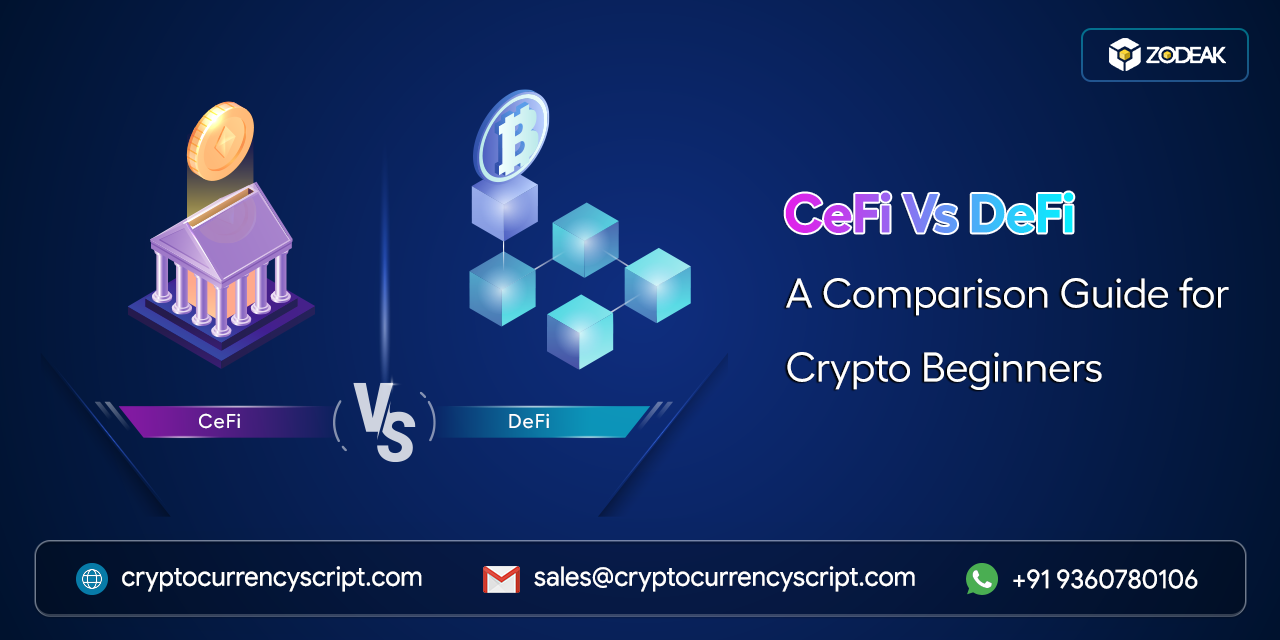In earlier times, the digital world we live in dealing with the Centralized Finance (CeFi) system for financial activities. However, after the advent of blockchain technology, the conventional system has given way to a new Decentralized Finance (DeFi) era. Besides, the focus now turns to the CeFi vs DeFi comparison, which we will cover later in this blog.
Both centralized and decentralized finance have unique metrics and it is crucial for beginners to understand the key differences between them. In this blog, we will compare CeFi vs DeFi and give you the information you need to make informed investment decisions.
Let’s get started…
CeFi vs DeFi: Definition
Centralized finance is a management-based system where the entire platform has admin involvement. It has intermediaries and third parties, for example, crypto exchanges platform to make transactions between their users. These exchanges operate as custodians of their users’ funds, allowing them to trade cryptocurrencies.
Decentralized finance refers to a financial system built on blockchain technology that aims to provide open and boardless financial services. It has a decentralized way of transactions between users and rejects the need for intermediaries and third parties.
CeFi vs DeFi: Fund Custody
CeFi: Centralized intermediaries hold and manage users’ funds on their behalf, providing convenience but requiring trust in the custodian.
DeFi: Users have direct control over their funds through self-custody wallets or smart contracts, reducing reliance on third-party custodians.
CeFi vs DeFi: Financial Activities
CeFi: Provides traditional financial activities like trading, investing, and savings accounts, often through centralized exchanges or banks.
DeFi: Offers a wide range of financial activities such as lending, borrowing, staking, yield farming, and more through smart contracts.
CeFi vs DeFi: Operations
CeFi: Uses centralized platforms and trusted intermediaries to supply services and facilitate transactions.
DeFi: Operates on decentralized networks and relies on blockchain technology and smart contracts for trustless execution and automation.
CeFi vs DeFi: Security
CeFi: Provides security through advanced security measures, regulatory compliance, and insurance funds, depending on the security system you build.
DeFi: Offers transparency and security through open-source code and audited smart contracts. but compare to centralized decentralized is more secure as it operated on the blockchain.
CeFi vs DeFi: Transparency
CeFi: This system is opaque, with limited transparency into how financial transactions are executed and processed.
DeFi: Transactions are recorded on a public blockchain, providing transparency and allowing anyone to audit and verify transactions.
CeFi vs DeFi: Accessibility
CeFi: Often have barriers to entry, such as geographical restrictions, minimum balance requirements, and onboarding processes.
DeFi: More inclusive and accessible to anyone with an internet connection. DeFi protocols are typically open to anyone who can connect to the blockchain.
CeFi vs DeFi: Innovation
CeFi: Centralized finance systems often require significant regulatory compliance and may be slower to adopt new financial products and services.
DeFi: These platforms are known for their innovation and programmability, as developers can build and deploy new dApps and services on the public blockchain.
CeFi vs DeFi: Market Cap
CeFi: The traditional financial markets have significantly larger market capitalization compare to the DeFi market, as it is operates for over a decade.
DeFi: While the DeFi market has grown rapidly, its total market capitalization is generally smaller compared to the traditional financial markets.
CeFi vs DeFi: Customer Service
CeFi: Traditional financial institutions typically offer customer support services, including direct communication channels for query resolution and dispute resolution.
DeFi: Customer support in DeFi can vary and is often community-driven, with fewer options for direct support due to its decentralized nature.
Comparison & Conclusion
The objectives of both Centralized Finance and Decentralized Finance are to enhance cryptocurrency exchanges and boost trading volume. However, these two ecosystems differ in their approach to achieving their goals.
CeFi aims to ensure the security of funds and fair trading practices. It allows investors with traditional currency to participate in crypto trading. Additionally, centralized exchanges offer customer support services that are not provided by DeFi platforms.
On the other hand, DeFi aims to create a space free from intermediaries. So it gives investors a platform to put their strategy into action without any hassle. Depending on the investor’s choices and needs, both models have advantages and downsides.
If transparency and privacy are important to you, DeFi is the suitable choice. However, if your priorities include trust, risk sharing, flexibility, and a wider range of investment options, CeFi is the way to go. Our experts who specialize in DeFi Development Company can assist you in selecting the appropriate financing model for your business. They can also assist you build financial applications on desired blockchains. Start your convo to determine your financial model now.





